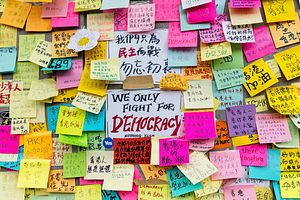After months of debate and public protests (most notably last year’s ‘Umbrella Movement,’ where protestors occupied streets in Hong Kong’s government and shopping districts), Hong Kong’s election reform plan went before the Legislative Council. The plan needed a two-thirds majority to pass; pan-democrats had pledged to vote as a bloc to defeat it. In the end, the pan-democrats were able to do one better: the plan will go down in history with majority voting against the reforms. Thanks to a last-minute walk-out by much of the pro-Beijing camp, the plan was defeated 28-8, with 34 legislators not voting.
The plan’s defeat was not surprising. The pan-democrats had the numbers to prevent the reforms from passing and they had unanimously vowed to do so. The reform package would require all candidates for Hong Kong’s chief executive to be approved by the majority of a 1,200-person nominating committee, stocked with pro-business (and pro-Beijing) members. Pan-democrats argued that effectively gave Beijing veto power over who could even run for Hong Kong’s highest office. Those in favor of the bill, however, countered that it’s the only realistic way forward toward giving Hong Kong universal suffrage in chief executive elections. Currently, the chief executive is chosen by the nominating committee, with the public having no say.
While the defeat of the bill was in line with pan-democrat promises, the means by which it occurred was unexpected – and odd. As Isabella Steger and Jacky Wong described for the Wall Street Journal, a group of pro-establishment lawmakers asked for a recess just after voting began. Their request was denied, but many of them left anyway – though not enough of them to deny quorum for the vote. The legislators who left explained that they had wanted to delay the vote to give one more member of their camp, Lau Wong-fat, extra time to make it. While the bill was expected to be defeated, it was expected to at least record majority support – something the walk-out prevented from happening. Interestingly, Xinhua’s main story on the vote neglected to mention the final tally, only noting (correctly) that 28 out of 70 total legislators had cast votes against, not that only eight votes had been in favor.
“We used our sacred vote today to veto a fake universal suffrage proposal,” Alan Leong, one of the pan-democrats, told reporters. “We helped Hong Kong people send a clear message to Beijing that we want real choice.”
Those who had argued in favor of the reform, saying it was Hong Kong’s best (and only) change at public elections for the special administrative region’s top office, marked their disappointment. Chief Executive CY Leung said in a statement that he, along with “millions of Hong Kong people,” was “naturally disappointed” with the result of the vote. “Today, 28 LegCo members voted against the wishes of the majority of the Hong Kong people, and denied them their democratic right to elect the Chief Executive in the next election,” Leung said. “Universal suffrage for the Chief Executive election has now been blocked.”
A spokesman for the Hong Kong and Macau Affairs Office of the State Council in Beijing said that the votes against the bill went against “mainstream public opinion in Hong Kong,” and was not what the central government wanted to see. “A minority of legislators, acting out of selfish interests, vetoed the general election bill [and] obstructed the development process of Hong Kong democracy,” Xinhua paraphrased the spokesman as saying.
With the plan now effectively dead in Hong Kong, those in favor of it want “the community to move on,” in Leung’s words. Leung said the Hong Kong government “will focus the efforts on the various economic development and livelihood issues” for the remainder of his term (two years –and possibly beyond, as Leung may be tapped for reelection in 2017).
The mainland-based Global Times struck a similar tone: “What’s important for now is that life in Hong Kong will go on. Against the background of failed political reform, each side should reach a consensus to maintain stability, and switch their attention to the economic and social development of the city.” Global Times more explicitly warned against the perils of continuing to push for political change rather than ‘moving on.’ If pro-democrats “don’t stop but organize more drastic street demonstrations, they will push Hong Kong to a dead end and mean a life and death struggle with the Basic Law,” Global Times warned. “In that case, Hong Kong will face dismal prospects.”
A brief news release by Xinhua cited the National People’s Congress as saying “its decision on Hong Kong’s electoral reforms last August will remain in force in the future, despite Hong Kong Legislative Council’s veto of the universal suffrage motion.”
































